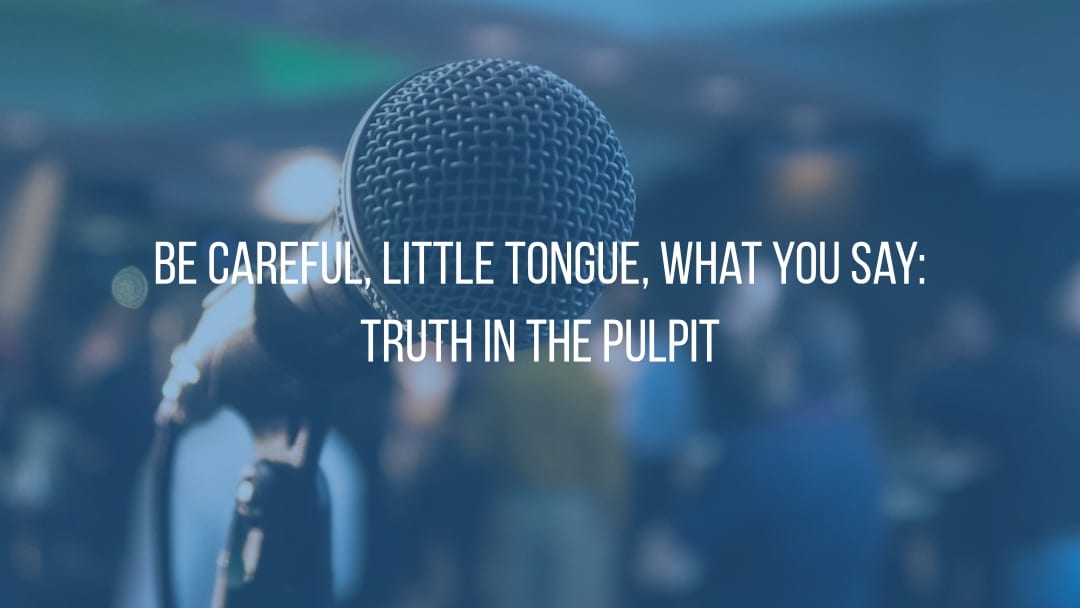Sexual sin. Financial shenanigans. Outright heresy. Bullying and creating a toxic work environment. These are obvious ways a pastor can betray their flock and bring public shame to the name of Jesus.
But there is a subtler way in which pastors can let down their congregations and bring the gospel of Christ into disrepute: passing on false or unsubstantiated information from the pulpit. Now, I’m not speaking of heresy or bad hermeneutics here. Those obviously violate the trust the congregation puts in their pastor and are an abuse of spiritual authority. I have in mind something a lot less obvious.
I have in mind a tendency I have observed among some pastors to play fast-and-loose with the truth. I’d like to think that this is always unwitting. But, as I’ll argue, that’s not always an excuse.
I’ve heard any number of suspicious claims from the pulpit over the years. And these weren’t fringe as-seen-on-TV churches, these were ordinary, local churches. Sometimes these were stories that just didn’t sound right. Sometimes they were statistics that just seemed too convenient. In recent years there have been conspicuous examples of pastors passing on Covid misinformation and political propaganda. And if you look long enough on the internet, you’ll find lots of people (especially atheists) happy to point out plenty of false claims in sermons made by pastors.
In my work vetting content for The Pastor’s Workshop, I ran across a popular pastor and Christian author recently making some surprising, yet familiar, claims about the moral decline of America. He claimed that in an anonymous survey, researchers found the following disturbing trends:
74% Will steal “from those who won’t really miss it.”
64% Will lie “when it suits me if it doesn’t cause any real damage.”
53% Will cheat on their spouse, “after all, given the chance, they would do the same.”
56% Will drink and drive, “if I feel that I can handle it.”
These are just a few of the claims pulled from The Day America Told the Truth: What People Really Believe About Everything That Really Matters by James Patterson and Peter Kim, published in 1991. These authors paint a bleak picture of the moral state of our society in the early 90s, and we can infer that things haven’t gotten better in the last thirty years. And they have gotten a lot of play in Christian circles.

I won’t name and shame the author in question. In part, this is because singling out someone when this source is so widely cited by Christian pastors and commentators would be unfair. I even found one quite well-known Christian author with significant authority in Reformed denominations making use of The Day America Told the Truth.
But what’s wrong with citing these statistics? After all, one author wrote that they came from “the most complete morality survey in the nation’s history.” What’s wrong with that?
Well, reasoning from statistics is tricky. And the methods by which information is gathered and conclusions are drawn from it matter — an awful lot. As in, if the methods are sufficiently flawed, the statistics should not be relied upon.
In a review of the book published around the time it was published, Tom W. Smith (an expert on studying public opinion), does not mince words, calling the book:
a stew of hyperbole, wild generalizations, and factoids, based on poorly documented and questionable data, and simplistic and bumbling analysis. (source)
His review is brief, so feel free to take a look. The overall point is this: the methods they disclosed were flawed (and they didn’t disclose all of them) and their analysis was often contradictory or mishandled in misleading ways. Maybe America is in moral decay. I’m inclined to think it is. But this book is not good evidence that it is.
At this point, you might be thinking:
You’re being a little unfair to the pastors (and others) who cited this book. These authors picked up a book from a major publisher that purported to be a good survey of American opinions and then used information from it. The fact that the statistics were gathered with poor methodology isn’t something they were trained to discern: M.Div. courses don’t usually include a class on statistics. So, we should think of their use of the information as an innocent error.
And here’s where I’ll say something that may be controversial: by virtue of their authority and the trust their congregations have placed in them, they still had a responsibility to check the truth of the claims they were making. If we lack expertise to evaluate a truth claim, we need to rely on those who do have the expertise. In the case of this book, I simply Googled the title with “review.” I saw the article by Tom W. Smith and quickly checked his credentials (which turned out to be sterling).
The fact that it was so easy to check the credibility of this book suggests that the recent authors who were using it didn’t do the basic work of checking out their source before passing on the statistics as truth.
It’s easy to make this error. The book’s claims tend to confirm something that I, too, suspect, that American society isn’t terribly moral. It would be easy to see this and, because it supports what I already think, use it as evidence that I’m right. The problem is that simply grabbing sources that confirm what I think without checking for credible alternatives is just a case of confirmation bias.
Citing a dodgy source might seem like a peccadillo. And it certainly pales in comparison to other ministerial missteps that are in the news today. Here are three brief reasons why you should be careful what you assert from the pulpit:
First, God is deeply concerned with truth. We are not to bear false witness. Jesus claims that he is the “way, the truth, and the life.” We are to be witnesses to the truth of the gospel in the world. Believing and speaking the truth should be among the central values of Christians. Having truth as a central value means that you must be careful to have good evidence for what you say. You probably already try do this (I hope!) when you handle matters of theology and the Word. You should also do so when you deal with more mundane topics. If we truly love truth, we will adopt this variation on W. K. Clifford’s famous dictum: “It is wrong always, everywhere, and for anyone to assert anything on insufficient evidence.”

Our allegiance to truth should move us to be critical thinkers about anything we say with the authority of the pulpit. But beyond that, the trust that our fellow Christians put in what we have to say and the spiritual authority vested in ministers of the gospel should give us even more motivation. Those with authority and invested with trust must be even more careful with the truth of what they say. Let your “yes” be “yes” and your “no” be “no,” in matters of fact as well as action. Certainly, we should not willingly tell falsehoods from the pulpit. But we should also not negligently say falsehoods from the pulpit, either. Recall what James has to say about teachers: “Let not many of you become teachers, my brethren, knowing that as such we will incur a stricter judgment” (3:1).
Our credit with nonbelievers is at issue, too. The world is watching. We claim that we have the truth in a marketplace full of competing religious claims. Many of the rising number of “nones” are already skeptical of what we have to say about the gospel. The innumerable scandals that have rocked nearly every denomination have done us no favors. If we are unreliable witnesses about little things, why should they trust us about the big ones?
So, what should we do?
It’s easy to say that critical thinking is important. But what does this mean in practice? You’re busy with caring for communities of believers and likely stretched too thin already. You probably don’t have time to enroll in a logic or critical thinking course in a local university.
- Be honest in how you frame illustrations and quotes: this is easy enough. But don’t present an illustration that you don’t have sufficient evidence to think is true as though it is if you have some doubt, it’s ok to say so. Many illustrations make their point well whether or not they’re true. If a quote says something really well, but it’s not clear whether the person actually said it, let your congregation know that there’s some doubt, but that it’s a good quote nonetheless.
- Prepare yourself with some general reading: there are a lot of great books out there that can up your critical thinking game. One of our recent blog authors, Travis Dickinson, even has a book on the topic: Logic and the Way of Jesus. But there are plenty of secular books out there which will do just as well. I found an interesting discussion of some approachable critical thinking books here. Newer books may also include good information about the best ways to assess digital sources, like Bethany Kilcrease’s Falsehood and Fallacy: How to Think, Read, and Write in the Twenty-First Century, which is aimed at undergraduates, but will benefit more mature readers as well.
- Refamiliarize yourself with logical fallacies: you probably learned these in college, but it doesn’t hurt to go over them again. Dickinson and Kilcrease both deal with fallacies in their books, but you can find websites dedicated to listing and explaining them. I like The Internet Encyclopedia of Philosophy’s list, though I admit its length may be daunting!
- Always think in terms of the trustworthiness of your sources: Where did this statistic, story, or factoid come from? Is it from a journalist in a reputable organization? Is the person speaking an expert on that subject in their own right? (What are their credentials?) When you find something on social media, don’t take it at face value. Can you track down the original source — how trustworthy is it?

- Fight against confirmation bias: you naturally probably do a double-take when something doesn’t seem true because it conflicts with what you believe. But fighting confirmation bias means being careful about accepting things which tend to confirm what you think. This doesn’t have to spiral into full-blown skepticism, checking absolutely everything. But if you’re going to assert something, it helps to do due diligence.
- Beware echo chambers: just because you hear something from lots of people you know doesn’t mean that it’s true. This is especially true about things you read on social media. Social media algorithms often exacerbate this by allowing you to be surrounded by people who think just like you do. This can happen with a church community, too, as many churches attract people from the same political persuasion. Also, if you haven’t been getting your news from sources with diverse political viewpoints, it’s probably time to do so. Interested in where news sources fall on the political spectrum? Check out this widely-circulated chart as a starting point.
- Cultivate intellectual humility: not only should we be willing to admit that we are wrong when we are confronted with evidence that we are, we should check our reasoning and our sources before we speak, recognizing that we might be wrong.
Of course, even if you are scrupulous, you’re going to occasionally make mistakes. But we can all improve. And it’s worth doing so for the sake of the value of truth, the trust invested in pastors, and the reputation of the gospel.
Speaking of intellectual humility: The Pastor’s Workshop is fallible too. We try to use reliable sources, but we sometimes get things wrong. Stu and I both try to vet what we post, and flag anything that we know to be unreliable, but we may miss something. If you see something, say something!

Bill Rowley (PhD, University of Rochester) is an executive assistant for The Pastor’s Workshop. An epistemologist and philosopher of religion, he has taught courses in philosophy and college-level writing and worked as an editor. He lives in Hamden, Connecticut with his wife and two dogs.
Don’t Miss
The Latest From Our Blog
New Site Launches Tomorrow!
Watch this Space! Tomorrow (May 29) is the official launch of the new The Pastor's Workshop site! Return to this blog tomorrow morning for a post highlighting the new features and explaining how subscribers can get on and start using the site! Here are some new...
How You Can Prep for Pentecost
This was originally posted on May 12, 2016 on https://huffpost.com Pentecost Came Like Wildfire I'm lying on an ice pack early this morning, doing my back exercises and listening to Pray as You Go, a tool for meditation, with monastery bells, music, and a Bible...
Sacred Spaces: the Church Forests of Ethiopia
Let's Go to Ethiopia! Here’s a fun exercise with a spiritual payoff. Go to Google Maps and view aerial images of the South Gondar zone of Ethiopia. Use this button:When the page loads, you'll see a light brown countryside, mostly farmland. There are thin lines of dark...





I am ecstatic to see this article. I feel passionately about what you wrote. I double and triple-check stories and statistics. I was so disappointed to hear my good friend pass on a bogus story on Christmas Eve. This is one of many reasons we lose people, lack of integrity. I started at a new congregation in July and promised my folks I would tell them when I gave an opinion or a debatable interpretation. Thanks for the essay.
Thanks Bryan! We’re really glad you liked it. Definitely an under-discussed reality in the preaching world.
Stu